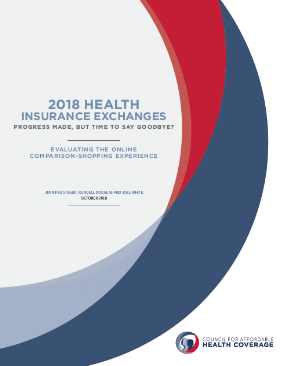
WASHINGTON, DC (October 29, 2018): As the 2019 open enrollment period for marketplace coverage under the Affordable Care Act looms large, the Council for Affordable Health Coverage (CAHC) – a coalition of employers, insurers, life science companies, PBMs, brokers, agents, patient groups, and physician organizations – has released a detailed new report on users’ 2018 experience with Healthcare.gov and each of the 12 state-based exchanges.
The report, “2018 Health Insurance Exchanges: Progress Made, But Time to Say Goodbye?” marks the coalition’s third annual review of the public exchanges. It graded the websites on seven key competencies, including access to detailed plan information, an out-of-pocket cost calculator, and an integrated provider directory and drug directory tool.
Among the report’s key findings:
- More than half the exchanges (7) received a D or F, all of them state-based. There was one A, four Bs and one C. The average exchange website scored 71 out of a possible 100 on our composite index.
- The DC Health Link’s exchange ranked first overall, scoring 92 out of a possible 100.
- Healthcare.gov, the federally-facilitated exchange that serves 38 states, ranked fourth in our index, scoring 81 out of a possible 100.
- Variation in exchange composite scores indicates the consumer experience is uneven across the country, with an F (a 48) at the low end and a high of 92. This may reflect the varying levels of commitment (both political and financial) to public exchanges.
- Ironically, the more ”blue” the state, the lower the score, on average. Six of the eight exchanges with the lowest scores are in states where liberals greatly outnumber conservatives, according to a Gallup poll. The poor performance of states inclined to regard the ACA less critically may reflect weak legislative oversight.
“CAHC members know that when consumers are empowered with tools to make informed health coverage decisions and compare their options, markets respond,” said CAHC President Joel White. “Sadly, our report shows that, once again, too many state exchanges are providing substandard service to users. While our findings show modest improvement from years past, it remains unacceptable that, in 2018, more progress has not been made. Meanwhile, trouble persists for Healthcare.gov which, five years after its launch, will be taken offline for maintenance at various points throughout the open enrollment season, offering little to no recourse for affected consumers.”
White concluded, “This all points to an anti-competitive public exchange monopoly that has failed to keep pace with e-commerce developments in the private sector, is shortchanging consumers, and is ultimately undermining the goals of the ACA. It is time to say goodbye to the public exchange model and turn, instead, to the innovation and responsiveness of the private marketplace. There’s no better time than the open enrollment season to have this dialogue and we look forward to making the case for private enrollment tools to Congress and the administration in the days ahead.”
The report offers the following recommendations:
- Over the next three years, transition to a privately-operated exchange model and eliminate funding for activities unrelated to the federal data hub in the HealthCare.gov program.
- During scheduled downtime for the 2019 open enrollment period, HHS should direct all traffic to private enrollment websites.
- Transition an increasing number of APTC eligible enrollees into privately operated exchanges, starting with at least 10 percent in the enhanced direct enrollment pathway in 2019.
- Congress should enable all beneficiaries to use their premium tax credits off the public exchanges, to also be used in the privately-operated exchange model when fully implemented.
- Reduce or eliminate the 3.5 percent premium tax that funds public exchange monopolies.
The report follows an earlier study from CAHC on the Medicare Plan Finder tool, which was covered in Forbes, Inside Health Policy, and TownHall, among others. To view the 2018 report card, click here. To view the full study, including a detailed explanation of each exchange score, click here.
###
About the Council for Affordable Health Coverage
The Council for Affordable Health Coverage (CAHC) is a broad-based alliance with a primary focus: bringing down the cost of health care for all Americans. CAHC promotes policies that lower health costs through increased competition, informed consumers and more choices. Learn more at CAHC.net.